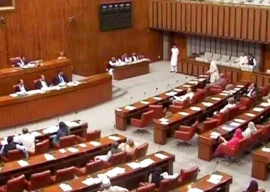
Once again, the plight of laborers is in the limelight after the fresh incident of a coalmine collapse in Orakzai Agency. It is said that heavy rainfall caused the coalmine to cave in. What is not being told is whether the miners were issued warnings about working in such precarious conditions.
The exact figure of the country’s population and its division into different professions is not known, courtesy of the census that did not take place for reasons unknown. However, some unofficial figures estimate that the around 80 million people — out of which merely five per cent are registered with social security institutions — have been involved in the industrial sector of the country and among them, the miners are the most neglected.
Balochistan, Khyber-Pakhtunkhwa and the tribal belt are heavily mined regions. Despite the militancy factor, investors have paved their way to the sites with the help of local chieftains and politicians.
According to Nasir Mansoor, deputy general secretary of the National Trade Union Federation, the mines are located in far flung areas out of the reach of labour rights’ watchdogs. Deaths and injuries out there rarely make news.
The whole mining process has been conducted under a law, The Mines Act, 1923. Though the law backs the provision of ample wages, workplace safety and adequate work hours, it remains un-implemented.
In the Orakzai incident, around 45 workers were trapped under the coalmine and the authorities had to carry out a giant operation involving the military’s rescue unit. The actual cause is yet not clear: some say it happened because of heavy downpours, others believe a gas explosion caused it. Both cases narrate a tale of inadequate safety arrangements.
No wonder that a ‘high-level’ committee, or two, will soon be set up to look into the incident and furnish its report based on the ‘absolute truth’. We have not learnt lessons from the past and the workplaces are still operating as death mills, where a labourer has to put his life at stake to earn bread for his family.
The laborers in the colony above the thick white clouds in the sky still await the answers to their questions and anticipate a day when their blood will pay off.
Published in The Express Tribune, March 30th, 2016.
1725967717-0/Untitled-design-(3)1725967717-0-405x300.webp)

1725275251-0/Untitled-design-(3)1725275251-0-165x106.webp)

1720097164-0/BeFunky-collage-(9)1720097164-0-165x106.webp)
1730547935-0/Untitled-design-(5)1730547935-0-270x192.webp)

1730544105-0/Untitled-design-(87)1730544105-0-270x192.webp)

1730543683-0/Express-Tribune--(3)1730543683-0-270x192.webp)







COMMENTS
Comments are moderated and generally will be posted if they are on-topic and not abusive.
For more information, please see our Comments FAQ